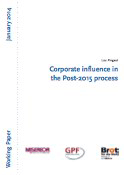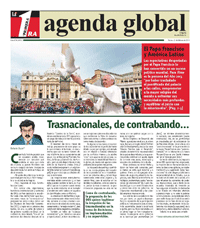Published on Mon, 2014-03-03 15:43
In a new working paper entitled "Corporate influence in the Post-2015 process" GPF's Lou Pingeot discusses the influence of transnational corporations in the Post-2015 process. This working paper by Brot für die Welt, Global Policy Forum and Misereor provides an overview of the main corporate actors in the post-2015 process and how they shape the discourse on development. The paper advocates for more transparency around the participation of corporations in UN processes, including their financial support to UN initiatives, and for more reflection on the risks of a corporate, private interests-driven development agenda. |
Published on Thu, 2014-02-27 23:00
In a recent report, the United Nations Special Rapporteur on the Right to Housing (“the Rapporteur”), Ms Raquel Rolnik called for a paradigm shift from the financialization of housing to a human rights-based approach. In the report, she builds on a previous one where she had highlighted how the deregulation, liberalization and globalization of housing finance have had major implications for housing and urban development, eventually leading to a global affordability and housing crisis. |
Published on Fri, 2014-02-21 19:19
Popular story has it that a custom officer was obsessed with finding out what the old man was hiding, as he crossed the border every day with a donkey loaded with hay. Never able to discover anything unusual in the forage, one day he announces: - I have just retired and I have no authority any more, but I will not die in peace if I do not get to know what your business really is. - It's easy, -replies the old man- I smuggle donkeys. |
Published on Fri, 2014-01-31 16:49
I’m at a three-day workshop on data and accountability for the post-2015 development agenda, hosted by the UN Development Programme (UNDP). I’m joined by a sizeable contingent of statisticians as well as representatives from governments, parliaments, international organisations, NGOs, the private sector and academia. |
Published on Thu, 2013-12-19 13:46
The National Social Watch Report on Governance and Development 2013, released today in Delhi, highlighted that 31% of MPs in Lok Sabha has pending criminal cases against them. The average salary package of each MP is 68 times higher than the percentage income in the country and total value of assets of 4 MPs is Rs. 29.2 billion. This report was released by Honorable Justice Ananga Patnaik, Supreme Court of India and Shri Satyanand Mishra former Chief Information Commissioner, Central Information Commission. Chief Guest Justice Ananga Patnaik said “this report gives an overview of our institutions”. He further added that giving only statistics would not work with parliamentarians and legislators. Give them suggestions as well. They may not accept them today and tomorrow they will be accepted. |
SUSCRIBE TO OUR NEWSLETTER







